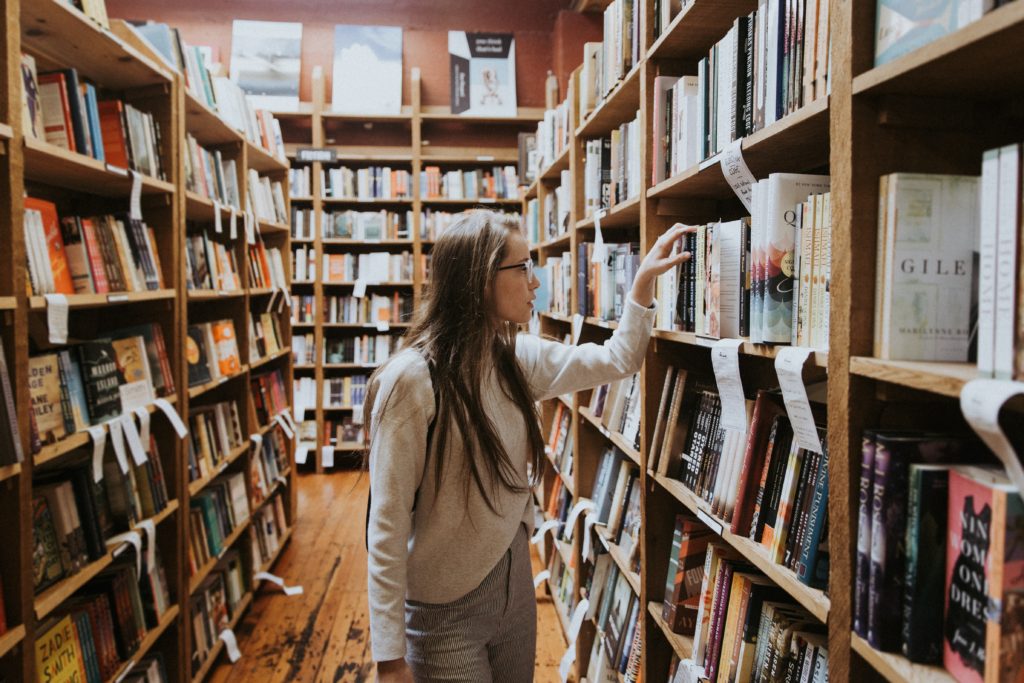Have you ever felt like education wasn't quite right for you? In this month's Creative Counselling column, Marie Bruce explains how self-education can empower us to learn more about the things we love
by Marie Bruce

Knowledge is power, or at least that’s what they say. There is some truth to this concept because the more you know, the less easy you are to fool. With back-to-school season in full swing, now is the perfect time to turn your attention towards your own education – and I’m not only talking about formal education.
I have to start by saying that I am not a great fan of the two main elitist universities in the UK – Oxford and Cambridge – because I think they need to be much broader in the range of students they accept from less privileged backgrounds. That being said, I would love to snoop around their gorgeous libraries. The bulk of UK universities are much more accessible and welcoming in their application and acceptance process, but while a university education is a great opportunity, for some people it simply isn’t always practical, possible or affordable.
With that in mind, I want to discuss the concept of self-education. Educating yourself at home has never been easier. In these days of internet search engines, laptops and iPhones, knowledge is only a couple of taps away. In today’s world, ignorance is totally optional, whereas in the past, it was a natural by-product of poverty. Not any more. People choose to remain ignorant by refusing to educate themselves with the resources available to them, and while you cannot and should not believe everything you read on the internet, learning how to be more discerning in your internet consumption is in itself a form of self-education.
Many of my columns this year have been about improving your confidence. It is vital that you have some degree of self-confidence because if you don’t, that’s when things like anxiety and low self-esteem step in and take over. I’m a big advocate of self-educating – it will increase your confidence and open up the doors of opportunity, because an educated mind comes across in all your interactions.
The beauty of self-educating is that you can dive into any topic that interests you. If you hated school you might have developed a blanket attitude to all education, telling yourself that it isn’t for you or that you’re simply no good at it. Try to think beyond the scope of formal educational subjects like maths and physics. Think instead about those topics that get you all fired up, because these are great areas with which to begin your self-education journey.
You might want to learn about the origins of the Black Lives Matter movement and systemic racism, for example. This is a topic that is very relevant to our current lives and also comes under the umbrella term of social science, so you are improving your general social science education every time you seek to learn more about this subject. Once you understand how subtle racism can be, you are more likely to recognise it and you will be able to make an intervention if necessary. Knowledge is power.
You could choose a topic that has a very personal impact on your day-to-day life. You may want to learn about, for instance, domestic violence, the common traits of an abuser and how they work to first love-bomb, then isolate their victims. This would come under psychological profiling, so not only are you educating yourself in the topic of psychology, but you are also less likely to remain in, or begin, a relationship with an abusive partner, because you will recognise the signs early on. Once again, knowledge is power.
Education is never a waste. You will always take something of value away from it, though you may not realise this until you actually need that knowledge. When I was a teenager, I took a few Red Cross First Aid courses as part of my first job at an equestrian centre. At the time, it was a good way to get out of the freezing temperatures in mid-winter, instead tucked away in a warm cosy cabin, drinking hot chocolate and learning how to make slings, how to cool burns and stem bleeds.
Two decades later, an accident in the local village pub meant that I was crouched on the floor, first recognising and then stemming an arterial bleed for a customer who’d had a bad fall. It took twenty years for me to use the things I’d learnt in First Aid classes as a sixteen-year-old girl, but when I needed it, the knowledge rose to the surface of my brain like the class was just yesterday. Knowledge is power, and it helped me to save a life.
How do you go about beginning to educate yourself? There are many ways to study, and most students develop a combination of study skills that help them to locate, absorb and remember information. You will need notebooks and pens, highlighters and study-flags. Decide what topic you want to study and use the following study skills tips to begin your self-education.
Make full use of the local library
Also, be aware that many university libraries do accept members of the public, so if you live in a university town, give them a ring and find out how to join. In this way you will have full access to a vast university library, without having to enrol as a student.
Read, read, read
You can never read enough around your chosen subject. Read as much as you can and develop your own ideas on the topic.
Build your own library
Search independent bookstores online to find the best deals and curate a library of books on your chosen subjects. Use study flags to mark out any pages of particular interest.
Use the press
Ring your chosen local/national newspaper and find out if and how you can gain access to their archives.
Make notes
As you read, make notes on the things that most interest you and that you want to remember. Highlight particular points of reference such as key dates, events and people. This will help you to retain the information as you learn.
Make vocabulary lists
I call these Lingo Lists. Basically, whenever you come across a phrase, term, or word that relates specifically to your chosen subject, write it down along with the definition. This is a quick crib sheet you can refer back to, helping you to learn the lingo of your topic more easily.
Mind mapping
This is the process of writing down random words that come to mind when you think of your topic. Take a blank sheet of paper, write the topic in the middle and then add any words that spring to mind, trying to cluster the words into themes. Add lines to see how the clusters join and how one theme interacts with another. This is a great trick to use if you’ve hit a wall and it can help you to see where you should study next.
Use the internet – with discretion
The common rule is that you need three separate sources of information, all saying the same or similar things, to regard it as truth. Be careful with this one though, as the internet is rife with false information. Use reputable sites such as gov.uk, the NHS website, local councils and so on. Don’t believe everything you read. Research your topic carefully and weigh everything up.
Use You Tube for access to free documentaries
The BBC has lots of documentaries uploaded onto its YouTube channel, so take a look to see if there is one available on your preferred topic. Also, watch documentaries on TV if they relate to your topic in any way at all. Make notes as you watch.
Watch political shows on TV
Watching highly educated people present arguments and counter-arguments is a great education in how to debate a topic respectfully, especially with people who disagree with you.
Attend seminars
Go to see the leading authorities speak on your chosen topic, or simply attend motivational seminars run by speakers you admire.
Remember that it is never too late
If applying to university isn’t possible for you right now, that doesn’t mean that it will never be possible. I achieved my first cap and gown at the age of 45, and now I’m on my way to my second. It’s never too late!
Take a First Aid course
You just never know when you’re going to need it. This is particularly true for all parents and carers. Knowledge is power.
I hope that these tips have helped you to see that education is always possible, no matter what your current circumstances might be. Pick your chosen subject, gather your books and study materials, find a quiet space, then study like you're channeling your inner Hermione Granger. Until next month,
Serene Blessings
Marie Bruce x
 About the author:
About the author:
Marie Bruce Dip. T.C. MBACP is a qualified psychotherapist, Cruse Bereavement Counsellor and best-selling self-help author. She specialises in grief and loss counselling, PTSD and military counselling, and life coaching.
In this monthly column, Marie offers simple tools used by therapists to help clients and readers improve their mental well-being.
Marie’s books are available on Amazon UK.
More from this author:
Creative Counselling: Nurturing Ambition
Creative Counselling: Magical Thinking
Creative Counselling: Lock-Down Low-Down
 About the author:
About the author: